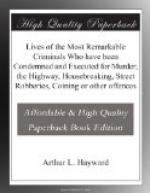On one of his nocturnal expeditions, in company with Levee and Featherby, they robbed one Mr. Brown, in Dean’s Court by St. Paul’s Churchyard, of a gold watch and thirteen guineas; upon which the gentleman thought fit, it seems, to offer in the newspapers a reward of five guineas for restoring the watch. Not many days after, he received a penny-post epistle from Mr. Barnham, in which he was told that if he came to a field near Sadler’s Wells, and brought the promised reward of five guineas along with him, he should there meet a single person at half an hour after six precisely, who would restore him his watch without doing him any injury whatsoever. At the time appointed the gentleman went thither, found Barnham walking alone, well dressed with a laced hat on, who immediately came up to him, and receiving the five guineas presented him with his watch.
Mr. Brown having no more to do with him, immediately turned round about to go back, upon which Barnham produced a pistol ready cocked from under his coat. You see, says he, it is in my power to rob you again; but I scorn to break my word of honour. Levee and Featherby, it seems, were posted pretty near and, as they all declared, intended to have shot the gentleman if he had brought anybody with him, or had made the least opposition or noise.
At Kingston assizes he was tried for a robbery committed in Surrey, but for want of sufficient evidence was acquitted, upon which he returned immediately to his old trade. About three months before he was apprehended for the last time, he came into Little Britain (the place where he was born), produced a silver spoon and fifteen shillings in money, declared it to be the effects of that day’s exploits, and then climbing up a lamp-post, thrust his head through the iron circle in which in winter time the lamp is placed, declaring to the neighbours who called him and advised him to reform, that within three months he would do something that should bring him to be hanged in the same place. As to the time he was not mistaken, though he was a little out as to the manner and place of his execution, and we mention this fact only to show the amazing wickedness of so young a man, of which we shall hereafter have occasion to say a great deal more.
Thomas Vaux was a fellow of no education at all. Whether he had been bred to any employment or not I am not able to say, but that which he followed was sweeping of chimneys, the profits of which he eked out with thefts, in which he continued undiscovered for a long space of time. In himself he was a fellow void of almost every good quality, disliked even by his own companions for his brutal behaviour which he still kept up even under his misfortunes, and ceased not to behave with an obstinate perverseness even to the last moment of his life.
The fact for which all this gang suffered was for robbing one Mr. Clark, at the corner of Water Lane, in Fleet Street,[82] which at their trial, was proved upon them by witnesses in the following manner:




